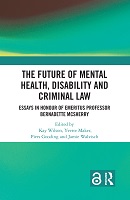Chapter 13 The Digital Turn in Mental Health and Disability Law
Proposal review
Actuarial Traditions and AI Futures of Risk Assessment From a Human Rights Perspective
Abstract
This chapter considers the use of automated and AI-enabled technologies in forensic mental health contexts, focusing on the use of predictive analytics in risk assessment. Risk assessment in forensic mental health care has been the subject of longstanding experimentation in quantitative techniques of prediction. Evolving algorithmic technologies and the increasing complexity of global networks of information and communication technology create additional possibilities, particularly with the advent of remote biometric monitoring and surveillance technologies. This chapter examines the legal implications of these developments by engaging with two threads of Bernadette McSherry’s work: (1) the use of actuarial risk assessments to predict and manage people deemed dangerous or ‘risky’ to themselves or others; and (2) the human rights implications of predictive practices that result in compulsory treatment, supervision or preventive detention of people with mental health conditions and disabilities. It seeks to extend McSherry’s work by considering potential benefits and shortcomings of a human rights-informed approach to governing emerging algorithmic risk assessment technologies in forensic mental health contexts, and identifying avenues for further research to inform critique and reform in this rapidly evolving field.


 Download
Download